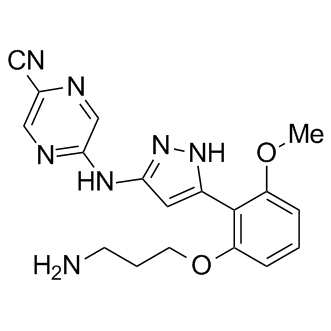LY2606368 (Synonyms: Prexasertib) |
| Catalog No.GC15663 |
LY2606368 (LY2606368) is a selective, ATP-competitive second-generation checkpoint kinase 1 (CHK1) inhibitor with a Ki of 0.9 nM and an IC50 of <1 nM. LY2606368 inhibits CHK2 (IC50=8 nM) and RSK1 (IC50=9 nM). LY2606368 causes double-stranded DNA breakage and replication catastrophe resulting in apoptosis. LY2606368 shows potent anti-tumor activity.
Products are for research use only. Not for human use. We do not sell to patients.

Cas No.: 1234015-52-1
Sample solution is provided at 25 µL, 10mM.
LY2606368, an ATP-competitive CHK1 inhibitor, is currently in the clinical stage with a Ki of 0.9 nM and an IC50 of[2].
Treatment of cells with LY2606368 results in the rapid appearance of TUNEL and pH2AX-positive double-stranded DNA breaks in the S-phase cell population. Inhibition of apoptosis by the caspase inhibitor Z-VAD-FMK had no effect on chromosome fragmentation, indicating that LY2606368 causes replication catastrophe[1].LY2606368 triggered S-phase DNA damage, such as pH2AX (S139) and TUNEL positive staining cells significantly increased in S-phase cells. LY2606368 also requires CDC25A and CDK2 to trigger DNA damage. In addition, LY2606368 causes replication catastrophe[1]. In primary patient-derived osteosarcoma cells, LY2606368 alone results in strongly reduced clonogenic survival at low nanomolar concentrations and acts by affecting cell cycle progression, induction of apoptosis and induction of double-stranded DNA breakage at concentrations that are well below clinically tolerable and safe plasma concentrations[3]. To investigate the combined effect of the Chk1 inhibitor LY2606368and antitumor drugs (GEM and S 1) on pancreatic cancer cell line SUIT 2. Acombination of LY2606368 and GS showed effective induction of apoptosis[4]. HGSOC cell lines were also sensitive to LY2606368, associated with induction of DNA damage and replication stress. LY2606368 also sensitized these cell lines to PARP inhibition and compromised both HR repair and replication fork stability[5]. BRCAwt HGSOC develops resistance to LY2606368 monotherapy via a prolonged G2 delay induced by lower CDK1/CyclinB1 activity, thus preventing cells from mitotic catastrophe and cell death[6]. PLK1 or CHEK1 inhibitors (BI-2536 or LY2606368) were found to exert a superior anticancer effect against cell lines at low nanomolar concentrations and induce cell-cycle arrest[7].
Up to 72.3% inhibition of tumor growth was observed in the three doses of LY2606368 tested, and mice lost no more than 3% of their body weight, indicating that LY2606368 was well tolerated in any treatment group. In addition, tumor regrowth was slow in the highest dose group during the 28-day recovery period, indicating a durable tumor response to LY2606368[1].
References:
[1]: King C, Diaz HB,et,al. Barda D, Marshall MS. LY2606368 Causes Replication Catastrophe and Antitumor Effects through CHK1-Dependent Mechanisms. Mol Cancer Ther. 2015 Sep;14(9):2004-13. doi: 10.1158/1535-7163.MCT-14-1037. Epub 2015 Jul 3. PMID: 26141948.
[2]: Yin Y, Shen Q, et,al. Chk1 inhibition potentiates the therapeutic efficacy of PARP inhibitor BMN673 in gastric cancer. Am J Cancer Res. 2017 Mar 1;7(3):473-483. PMID: 28401005; PMCID: PMC5385637.
[3]: Heidler CL, Roth EK, et,al. Prexasertib (LY2606368) reduces clonogenic survival by inducing apoptosis in primary patient-derived osteosarcoma cells and synergizes with cisplatin and talazoparib. Int J Cancer. 2020 Aug 15;147(4):1059-1070. doi: 10.1002/ijc.32814. Epub 2019 Dec 19. PMID: 31782150; PMCID: PMC7384073.
[4]: Morimoto Y, Takada K, et,al. Prexasertib increases the sensitivity of pancreatic cancer cells to gemcitabine and S?1. Oncol Rep. 2020 Feb;43(2):689-699. doi: 10.3892/or.2019.7421. Epub 2019 Nov 28. PMID: 31789403.
[5]: Parmar K, Kochupurakkal BS, et,al. The CHK1 Inhibitor Prexasertib Exhibits Monotherapy Activity in High-Grade Serous Ovarian Cancer Models and Sensitizes to PARP Inhibition. Clin Cancer Res. 2019 Oct 15;25(20):6127-6140. doi: 10.1158/1078-0432.CCR-19-0448. Epub 2019 Aug 13. PMID: 31409614; PMCID: PMC6801076.
[6]: Nair J, Huang TT, et,al. Resistance to the CHK1 inhibitor prexasertib involves functionally distinct CHK1 activities in BRCA wild-type ovarian cancer. Oncogene. 2020 Aug;39(33):5520-5535. doi: 10.1038/s41388-020-1383-4. Epub 2020 Jul 9. PMID: 32647134; PMCID: PMC7426265.
[7]: Yoshida K, Yokoi A, et,al. Aberrant Activation of Cell-Cycle-Related Kinases and the Potential Therapeutic Impact of PLK1 or CHEK1 Inhibition in Uterine Leiomyosarcoma. Clin Cancer Res. 2022 May 13;28(10):2147-2159. doi: 10.1158/1078-0432.CCR-22-0100. PMID: 35302600.
Average Rating: 5 (Based on Reviews and 12 reference(s) in Google Scholar.)
GLPBIO products are for RESEARCH USE ONLY. Please make sure your review or question is research based.
Required fields are marked with *




















